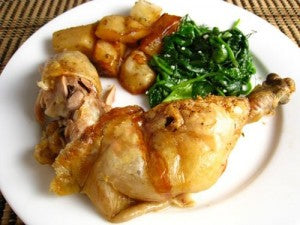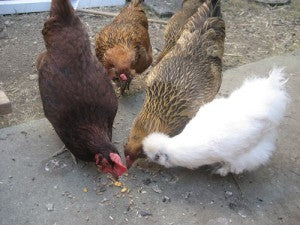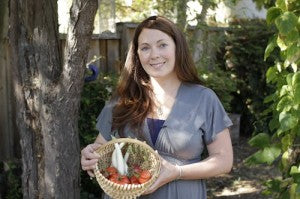Finding the Perfect Chicken
Posted on Monday, April 03, 2017 | By Alycia Lang | By Nicole Easterday and Lisa Gasink The most exciting thing about planning to keep chickens has to be selecting the breeds you will keep. There are so many varieties to choose from: great egg layers, fryers, adorable little puffy things with fuzzy legs and giant majestic creatures. We examine some of the choices with the pros and cons and include resources for SF Bay Area as well as some online options for those of you who live elsewhere.
By Nicole Easterday and Lisa Gasink The most exciting thing about planning to keep chickens has to be selecting the breeds you will keep. There are so many varieties to choose from: great egg layers, fryers, adorable little puffy things with fuzzy legs and giant majestic creatures. We examine some of the choices with the pros and cons and include resources for SF Bay Area as well as some online options for those of you who live elsewhere.
Article TLTR? We understand - you've got seedlings to water - skip straight to our awesome FARMcurious Breed Selector Chart.
We can't tell you how many times a week someone tells us they're getting chickens. Everyone from school teachers to lawyers seems to be installing a backyard coop and there are so many questions. What breeds are best for backyards, what kind of housing do they require, where can I find supplies? Rather than answering the same questions over and over we thought it might make sense to answer these questions in a series of blog posts. This post will explore breed options and resources; you can find our recent post about housing requirements here.
First, let's talk about the four primary reasons people seem to keep backyard birds:
Four Reasons to Keep Backyard Chickens:
 Can you guess which egg came from our free-ranging chicken and which came from the store?
Can you guess which egg came from our free-ranging chicken and which came from the store?
1) Eggs - One taste of a farm-fresh egg and you're hooked. Most of us start out by standing in line at the farmer's market every week at 10am, clutching our twelve dollars (!!) and hoping against hope our favorite farm doesn't run out before our turn at the counter. Been there. It only took a few weeks in a row of missing out on River Dog Farm's eggs before we started talking about keeping our own birds.
If this is your number one reason for keeping chickens, you'll want to look for the strongest layers and might sacrifice some other traits in exchange for excellent laying habits (Rhode Island Red, anyone?) Bonus: it's nice to know the eggs you eat come from sustainably raised animals that are loved and cared for.
 2) Meat - Admittedly fewer backyard flocks are destined for the dinner table, but don't immediately discount this idea. Given the conditions of industrial chicken raising facilities and the continued demand for poultry on the table, many people are turning to home meat production.
2) Meat - Admittedly fewer backyard flocks are destined for the dinner table, but don't immediately discount this idea. Given the conditions of industrial chicken raising facilities and the continued demand for poultry on the table, many people are turning to home meat production.
If this is your goal, you'll want to look for birds that pack on the pounds early and have a largish size at maturity. The great thing about raising your birds with dinner in mind is that it's actually more sustainable in that you won't have to worry about how to 'dispose' of any unwanted roosters that end up in your flock. You can imagine how unsustainable it is for an enormous new population of backyard chicken owners to demand only hens when the birth rate is still 50/50 hens to roosters. Don't automatically assume you're off the hook on animal cruelty just because your hens are only egg layers. Just saying…
 3) Compost/Gardening - Though most of us were raised thinking poop is something you want to avoid at all costs, gardeners and farmers know better. Chicken manure is full of nitrogen, something that is often lacking in gardener's best friend, the compost pile. Without going into too much detail (we'll save that for another post), you want to include equal parts 'brown' materials such as fallen leaves and animal bedding like straw with equal parts 'green' materials such as kitchen scraps, weeds and manure. Without the correct balance the compost will either be too dry and not break down or will start anaerobic activity which will stink terribly. Guess what?? The soiled bedding from your coop is the perfect mix of 'greens' and 'browns' - eureka! Thank you chickens!
3) Compost/Gardening - Though most of us were raised thinking poop is something you want to avoid at all costs, gardeners and farmers know better. Chicken manure is full of nitrogen, something that is often lacking in gardener's best friend, the compost pile. Without going into too much detail (we'll save that for another post), you want to include equal parts 'brown' materials such as fallen leaves and animal bedding like straw with equal parts 'green' materials such as kitchen scraps, weeds and manure. Without the correct balance the compost will either be too dry and not break down or will start anaerobic activity which will stink terribly. Guess what?? The soiled bedding from your coop is the perfect mix of 'greens' and 'browns' - eureka! Thank you chickens!
 4) Companionship - What a delight to find that your useful little backyard breakfast-makers are also charming, relatively intelligent little creatures. We so enjoy sitting in the yard watching them peck around that we call it "chicken TV". Chickens can even live harmoniously with your other backyard beasts like domestic dogs and cats. Our favorite chicken ever used to spread her wings out and lay on the deck with the dogs - she had no idea she was a chicken. What better way to teach your little ones (and yourself!) about where food comes from than to bring a little love into your life?
4) Companionship - What a delight to find that your useful little backyard breakfast-makers are also charming, relatively intelligent little creatures. We so enjoy sitting in the yard watching them peck around that we call it "chicken TV". Chickens can even live harmoniously with your other backyard beasts like domestic dogs and cats. Our favorite chicken ever used to spread her wings out and lay on the deck with the dogs - she had no idea she was a chicken. What better way to teach your little ones (and yourself!) about where food comes from than to bring a little love into your life?
Now that you’ve decided you simply MUST have chickens, let’s discuss what characteristics you should be on the lookout for when making your selections. Because different varieties of chicken were bred for different purposes, we have many options to consider when choosing a breed. Below are the top considerations for backyard flocks. Refer to the FARMcurious Breed Selector Chart for a quick reference to see which breeds fit into which categories.
Three Considerations in Choosing Chicken Breeds:
 1) Output (egg-laying frequency and meat production) - There are essentially three categories when it comes to output - layers, fryers (meat birds) and dual purpose. If you’re raising chickens for eggs, you want a layer or a dual-purpose. Choose fryers if you’ll be culling your flock for meat.
1) Output (egg-laying frequency and meat production) - There are essentially three categories when it comes to output - layers, fryers (meat birds) and dual purpose. If you’re raising chickens for eggs, you want a layer or a dual-purpose. Choose fryers if you’ll be culling your flock for meat.
2) Temperament (friendliness/sociability, noise level and tolerance of confinement) - Just like dogs, some breeds are known for their friendliness, sociability and, yes, even trainability. Similarly, some breeds are known to be noisier than others - in some cases this means they cluck happily and fairly quietly all day long, but in other cases they might squawk loudly at you and at each other all day long. If you live in a densely populated area, this will matter more to you than if you live in a rural area so it may be something to keep in mind. Finally, some breeds are much more tolerant of confinement than others. If you plan on keeping your birds in a smallish coop and run you’ll want to choose appropriately.
That said, also just like dogs, you should keep in mind that there is variability between individuals. Just because Buff Orpingtons are known to be friendly in general doesn’t necessarily mean yours will be. And, on the other side of that equation, if a breed is known to be less friendly, raising it from a chick and showing it love and affection may result in a very friendly addition to your flock. We leave it to you to debate nature vs. nurture. We’re trying to stay neutral over here!
 3) Aesthetics (breed markings and egg coloring) - Designer chickens came into fashion during the Victorian era when breeds were developed and classified for showing birds. If you’re really into this type of thing you can totally geek out on the official markings of the breeds and their other characteristics. You can find a fun list of chicken varieties complete with photos here.
3) Aesthetics (breed markings and egg coloring) - Designer chickens came into fashion during the Victorian era when breeds were developed and classified for showing birds. If you’re really into this type of thing you can totally geek out on the official markings of the breeds and their other characteristics. You can find a fun list of chicken varieties complete with photos here.
You probably already know that different breeds are known for the coloring of their eggs but you may not know that each individual chicken has her own signature egg shape and color as well. We won’t deny that showing off those gorgeous blue and green eggs are what drove us to choose to raise some Ameraucanas in our flock. It’s just another way to distinguish your eggs from those sad, pale things at the grocery store.
In the end, we can't tell you which chicks to take home but we'll know you'll have a fun time deciding. For our part, we can tell you that Lisa has her eye on a Swedish Flower Hen, a Barred Rock and either an Easter Egger or a Buff (or Lavender) Orpington while Nicole (who already has Easter Eggers) hopes to add a Cuckoo Maran and a Barred Rock to the flock. Happy hunting!!!Where to Find Chicks in the SF Bay Area:
Bay Area Farm, Feed and Pet StoresPollinate Farm & Garden - (Oakland) An urban farm store in the Fruitvale district offering pre-order, straight run, hard-to-find heritage chicks starting in late April and through May.
BioFuel Oasis (Berkeley) The biofuel/farm store standby, their chick schedule is posted on their site.
Mike's Feed and Pets (San Leandro) An all-purpose pet supply store in San Leandro carries some of the more common breeds like sex links and rhode island red but also some silver laced wyandottes, etc.
Concord Feed - (Dublin, Pleasant Hill, Concord) This is where we got our first batch of hens and we were very happy with the results - the straight run came out 50/50 and the 90% accuracy birds turned out to be all hens. They post their Chick Schedule online.
Half Moon Bay Feed and Fuel (Half Moon Bay) Chicks arrive every Thursday during the season and they update deliveries on their Facebook Page
Wilson's Feed & Supply Store (Napa) Phone Number: 707) 252-0316 - Show up early because they sold out of the breed we wanted within a few hours!!
About the Authors: Nicole Easterday Nicole is an Oakland resident, urban farmer and founder of FARMcurious who teaches urban homesteading classes and offers DIY food demonstrations at the homes of urbanites hoping to reconnect with their food. Nicole has been growing vegetables in an urban setting for five years and is constantly discovering new ways to grow more food in compact spaces. Having kept chickens as a child, she now tends a small flock in her backyard in Oakland. As part of her urban homesteading lifestyle, Nicole is mother to the most adorable baby boy ever, runs FARMcurious' retail site and workshops, tends the garden and various animals and also manages to grow much of her family's own produce, craft her own cheese, can seasonal produce and somehow (sometimes) blog about it all.
Nicole Easterday Nicole is an Oakland resident, urban farmer and founder of FARMcurious who teaches urban homesteading classes and offers DIY food demonstrations at the homes of urbanites hoping to reconnect with their food. Nicole has been growing vegetables in an urban setting for five years and is constantly discovering new ways to grow more food in compact spaces. Having kept chickens as a child, she now tends a small flock in her backyard in Oakland. As part of her urban homesteading lifestyle, Nicole is mother to the most adorable baby boy ever, runs FARMcurious' retail site and workshops, tends the garden and various animals and also manages to grow much of her family's own produce, craft her own cheese, can seasonal produce and somehow (sometimes) blog about it all.

